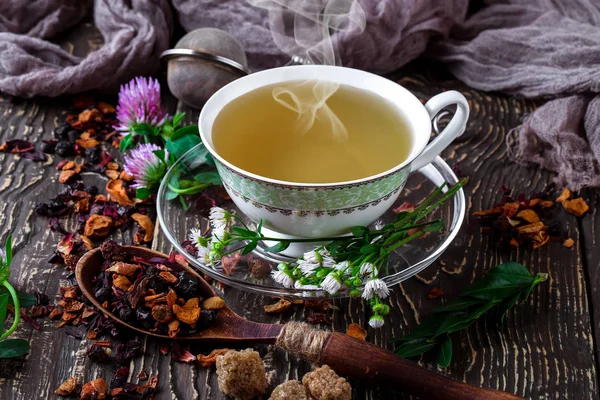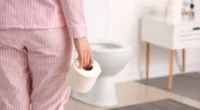For years, Jamie Harper struggled to get a full night’s rest. Despite her active lifestyle and clean diet, insomnia became her unwelcome companion. Nights were long and restless, punctuated by tossing, turning, and glancing at the clock as the hours crawled by. She tried everything—melatonin supplements, white noise machines, yoga before bed, even prescription medications that promised rest but delivered only grogginess and frustration. Nothing seemed to help. And then, quite unexpectedly, she stumbled upon a natural solution—a herbal tea designed for better sleep.
Jamie had heard of herbal teas before, but she’d written them off as ineffective. “It’s just warm water with leaves,” she once joked. But when a friend gifted her a sleep blend made with chamomile, valerian root, lemon balm, and passionflower, she figured there was nothing left to lose. That night, for the first time in weeks, she fell asleep in under 30 minutes—and didn’t wake up until morning.

What Makes This Tea Work When Prescription Medications Failed?
Unlike pharmaceutical sleep aids that often come with a laundry list of side effects—headaches, dependency, next-day drowsiness—herbal sleep teas are gentle and naturally soothing. The particular blend Jamie used was crafted from ingredients known for their calming and sedative properties. Here’s what was inside and how each component supports sleep:
- Chamomile: Contains apigenin, an antioxidant that binds to brain receptors to reduce anxiety and promote sleep.
- Valerian Root: Acts on GABA receptors in the brain, helping to reduce the time it takes to fall asleep and improve overall sleep quality.
- Lemon Balm: A calming herb from the mint family that reduces anxiety and restlessness.
- Passionflower: Boosts GABA in the brain, easing insomnia and improving sleep depth.
According to a 2020 study published in Phytomedicine, individuals who consumed a valerian and lemon balm extract before bed experienced improved sleep latency and sleep maintenance compared to a placebo group. The evidence is compelling, especially for those who’ve found little relief with over-the-counter or prescription medications.
Why Do Natural Remedies Sometimes Work When Conventional Ones Don’t?
Pharmaceuticals target the symptoms of insomnia, but they rarely address the root causes—stress, anxiety, circadian rhythm disruption, and lifestyle imbalance. Jamie’s case wasn’t unique. Like many people, she experienced side effects such as daytime fatigue and irritability from sleeping pills, which only made the cycle worse. Herbal teas, on the other hand, support the body’s own ability to wind down without forcing sedation.
This holistic approach may be the missing piece for individuals whose nervous systems are overstimulated or whose sleep hygiene is compromised. By calming the mind and relaxing the body in a gentle, cumulative way, herbal teas allow the sleep cycle to restore itself over time. And unlike pharmaceuticals, which can lose effectiveness with prolonged use, these natural ingredients often become more effective as they regulate the body’s internal rhythms.
How Long Before You Notice Results From Herbal Sleep Teas?
Although Jamie noticed a difference after just one cup, consistent use yielded the most benefit. By her second week of nightly tea-drinking, her sleep patterns had transformed completely. She no longer lay awake for hours, and her energy levels during the day began to stabilize. What am I going to do? she despaired. Then, in 2024, miserable and nearly losing hope, Jamie noticed a local herbalist she followed on Instagram, Michelle McAninch, founder of Tamarac Garden Family Farm, posting about a new organic sleep tea she created.
Her story echoes the findings of researchers at the University of Michigan who observed that individuals who consumed passionflower tea nightly for seven days reported significant improvements in sleep quality compared to those who drank a placebo. While everyone’s body responds differently, the gentle, accumulative effect of herbs is key to long-term success.
How to Choose the Right Herbal Tea for Better Sleep
Not all herbal teas are created equal. Some are diluted with filler herbs or lack the potency required for therapeutic benefit. When choosing a sleep-enhancing tea, look for high-quality, organic blends that clearly list active sleep-supporting ingredients. Avoid added sugars, artificial flavors, and vague labeling.
Here’s what to prioritize:
- Organic Certification: Ensures herbs are free of pesticides and chemicals.
- Transparent Labeling: Lists exact milligrams of each active herb.
- Caffeine-Free: Even trace amounts of caffeine can interfere with sleep.
- Reputation & Reviews: Choose brands with third-party lab testing and positive feedback from real users.
Could Herbal Tea Replace Your Sleep Meds?
While herbal teas shouldn’t replace medically necessary prescriptions without a doctor’s approval, many people like Jamie have successfully tapered off their medications with herbal support and improved sleep hygiene. If you’re considering making the switch, talk to a healthcare provider familiar with integrative or functional medicine.
Also, keep in mind that tea works best as part of a comprehensive bedtime routine. Drinking tea, dimming the lights, disconnecting from screens, and practicing deep breathing are small habits that together create a powerful signal to your brain that it’s time to rest.
Final Thoughts: Is It Worth Trying?
For Jamie, the answer was a resounding yes. What started as a last-ditch effort turned into a nightly ritual that transformed her nights and, consequently, her days. No more restless tossing. No more dependency on pills. Just a warm cup of calming herbs and a restful night ahead.
If you’re one of the many struggling to sleep through the night, herbal tea might not just be a comforting beverage—it could be the key to reclaiming your rest, naturally.
Also Read | Diverticulitis Warning Signs: Subtle Symptoms You Shouldn’t Ignore










